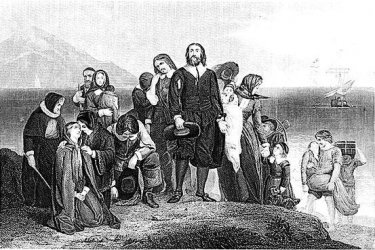Trajan
conscientia mille testes
the first piece is re-published the day before thanksgiving since it was written in 1961, its a commentary on the 'Desolate Wilderness' piece they run every day before as well....(which I have included in whole in post 2, since their is no copyright infringement via wsj).
I am thankful,very very thankful for what I have on any and every level, spiritually and materially. I am thankful they set out from Delftshaven, as they and their generations provided a place to go in turn for my grandfather and grandmother who set out from Sicily in 1908 and 1915, their after generations have thrived here, in ways we never could have realized if they had not left their native homes for this Fair Land.
God bless America.
"But we can all remind ourselves that the richness of this country was not born in the resources of the earth, though they be plentiful, but in the men that took its measure. For that reminder is everywhere-in the cities, towns, farms, roads, factories, homes, hospitals, schools that spread everywhere over that wilderness.
We can remind ourselves that for all our social discord we yet remain the longest enduring society of free men governing themselves without benefit of kings or dictators. Being so, we are the marvel and the mystery of the world, for that enduring liberty is no less a blessing than the abundance of the earth.
And we might remind ourselves also, that if those men setting out from Delftshaven had been daunted by the troubles they saw around them, then we could not this autumn be thankful for a fair land."
Vermont Royster ( long time wsj reporter)
And the Fair Land - WSJ.com
I am thankful,very very thankful for what I have on any and every level, spiritually and materially. I am thankful they set out from Delftshaven, as they and their generations provided a place to go in turn for my grandfather and grandmother who set out from Sicily in 1908 and 1915, their after generations have thrived here, in ways we never could have realized if they had not left their native homes for this Fair Land.
God bless America.
"But we can all remind ourselves that the richness of this country was not born in the resources of the earth, though they be plentiful, but in the men that took its measure. For that reminder is everywhere-in the cities, towns, farms, roads, factories, homes, hospitals, schools that spread everywhere over that wilderness.
We can remind ourselves that for all our social discord we yet remain the longest enduring society of free men governing themselves without benefit of kings or dictators. Being so, we are the marvel and the mystery of the world, for that enduring liberty is no less a blessing than the abundance of the earth.
And we might remind ourselves also, that if those men setting out from Delftshaven had been daunted by the troubles they saw around them, then we could not this autumn be thankful for a fair land."
Vermont Royster ( long time wsj reporter)
And the Fair Land - WSJ.com
Last edited:

